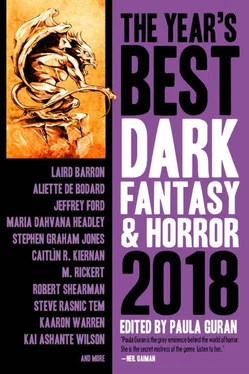After two days spent at the cottage in Sennen Cove, occupying my time with walks along the beach, cycling along sunken lanes to little villages like Sancreed and drinking in coastal pubs where Cornish fishermen still grumbled darkly into their cider about “English settlers,” my thoughts were turned again by an outside agency to Celia Waters.
It was while drinking in the local pub, The Old Success Inn, I noticed someone had posted up a flyer on its noticeboard which advertised a play and its performance dates at the Minack. The thing was shoddily produced, being a black-and-white photocopied sheet of A5 paper with what looked like a still from one of those 1920s silent German Expressionist films at its center. It was bordered with Celtic latticework. The cast were listed, amongst whom, was, of course, Celia Waters. And I now learnt the title of the play for the first time: New Quests for Nothing . The writer, director and producer was listed as one “Doctor Prozess.”
The first night was this evening at 7:30 p.m.
I looked at my watch. It was just after five.
I ordered another scotch and soda, trying to make my mind up whether or not to honor my promise.
By 7:25 p.m. I was seated at the Minack Theatre, rather the worse for drink. I had stuck to scotch and soda, with only one beer in between, so as not to fill my bladder during the play and perhaps suffer the awkwardness of having to wander out mid-performance in search of the public conveniences. But I wasn’t really used to drinking spirits and, one packet of crisps aside, the booze had worked on an empty stomach.
I had been to the Minack for the first time last year but the unique nature of it as the setting for a theatrical show impressed me just as much on this subsequent occasion. The venue is an amphitheatre carved into the side of a cliff with incredible views of the Atlantic stretching to the horizon. Huge gulls whirl and twist in the air currents, their cries echoing against the boom of the waves crashing on the rocks far below. And as the sun goes down one is hard pressed to keep one’s attention on events on the platform stage right at the bottom of the tiered open seating.
I had plenty of room to myself, with only one other person on the same row, and he was some fifteen yards away. I counted around thirty people inside, dotted here and there, which made for an atmosphere very much like the venue being empty given its large capacity. There was no buzz of conversation from the patrons before the show began, no rustle of programmes being consulted, and no real sense of anticipation whatsoever.
The effects of the bracing sea air and the half hour walk to get from Sennen Cove to the Minack had finally begun to sober me up when the four actors entered the arena and began their performance.
They were all in formal black tie and tails, as if at a dinner party, both the two men and two women. It was very difficult to tell them apart. They were also all caked in white face-paint with dark circles marked around their eyes and with their scalps closely shaven. I only barely recognized Celia Waters.
When she had described the play to me as an experimental piece I realized it had been an understatement. After some fifteen minutes of watching and listening to the actors I was still at a loss to know what was going on. Their dialogue was risible and incoherent, wandering from one subject to another with no definite purpose, and full of allusions and references that were never explained. They acted the piece in the stylized, melodramatic manner of the silent films of the 1920s with grand gestures and overwrought expressions. I wondered whether, quite deliberately, as with Brecht, the intention was to alienate the audience.
In my case, all I felt was a sense of profound depression and boredom. Eventually the dialogue even began to repeat itself, with one refrain in particular cropping up time and time again:
the fear of masks removed
as black lightning illumines
new quests for nothing
the amnesiac thoughts
of dying brains
repeated but forgotten…
Well, this same farrago went on for another hour and a half, without any interval and by now the sun had set and the moon had risen. Most of the audience had simply got up and left by this point, and were probably demanding refunds at the box office.
I would have left too, but for the natural, outside event that accompanied the play. I imagine that this performance had been carefully scheduled by the auteur behind New Quests for Nothing to coincide with the phenomenon. I hadn’t known of it in advance, and indeed, I cannot say I saw the event reported in the press thereafter, but it certainly occurred. I am convinced I did not imagine it.
A lunar eclipse was taking place and gradually the moon turned blood-red as it passed through the Earth’s shadow.
During this event the actors fell to their knees, arms raised aloft, and started chanting gibberish.
I watched for another five minutes and then left just as the eclipse began to finish. I had no idea whether or not the play continued, but I didn’t want to see it through until the end. Nor did I want to have to run the risk, afterwards, of having to speak to Celia Waters about it. As I have said, there was scarcely anyone now left in the audience, and there was a chance she may have noticed me sitting there, having kept my promise to attend.
I returned to London the next day, having cut short my trip. My cousin in Sennen Cove advised me, some weeks later, that the play had been pulled after that one performance and had caused something of a rumpus locally as an obvious attempt at a publicity stunt. Eventually, the actors had to be physically removed from the stage by the management, for they carried on with the thing even when the theatre was completely empty.
Another play was hastily scheduled at short notice by the Minack to fill the gap; something by Alan Ayckbourn I believe.
I never heard anything further about New Quests for Nothing or “Doctor Prozess” over the years. Though for some reason I half-expected it to turn up again at the Edinburgh Fringe Festival.
But I did encounter Celia Waters again, twenty years after the events I’ve already described.
By now I had long since left the play publishing business and taken up employment in another field altogether, working for a small property development agency situated in north London. One of our clients, who owned a number of derelict properties in Cornwall, but who lived in London, contacted us for a feasibility study on the erection of three new houses on a place about a mile or so from Sennen that had been, during the 1970s and 1980s, a “surf village” called “Skewjack.” People would bus over from it to the sandy beach at Sennen Cove. The place had been closed for decades, although a cottage on the site was still occupied and was rented out to a tenant who also acted as nominal caretaker for the grounds. No maintenance duties were required, but simply an on-site presence to keep the chalets and other buildings free from the likes of squatters or arsonists.
I hadn’t been down to that part of Cornwall since that last trip, twenty years earlier. My cousin had emigrated to Australia six months after my visit, having met, fallen in love with, and hastily married a young woman from Sydney who had been on holiday in this country.
After arriving in Penzance (the last leg of the journey as interminable as I remembered it to be), I took a cab from the station in order to reach the remains of Skewjack surf village. We were almost at Land’s End before it turned left off the A30 into a lane. One more left turn, then ahead for a few hundred yards and the vehicle parked at my destination. I told the driver to wait for me. I didn’t think my business there would take more than twenty minutes at most to conclude. This was simply a preliminary evaluation.
Читать дальше












